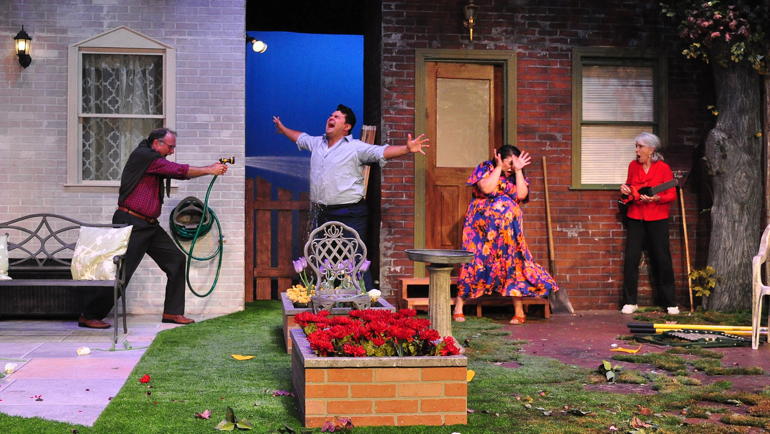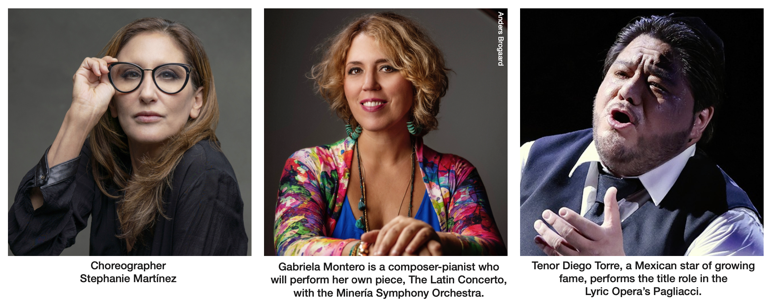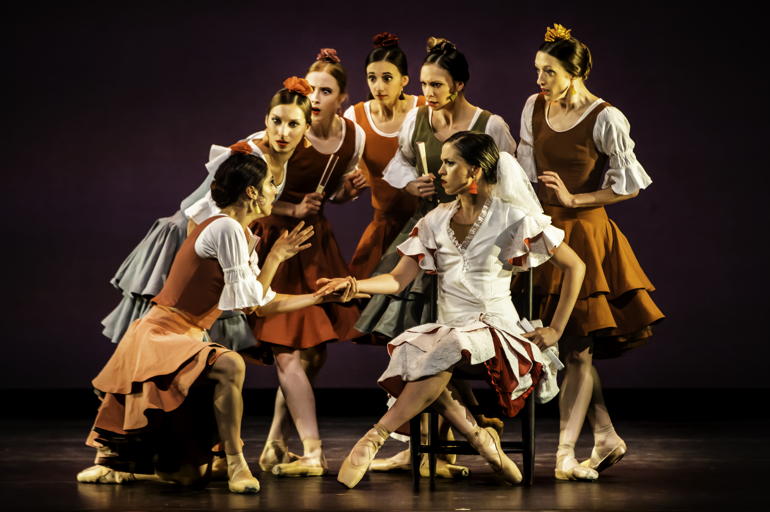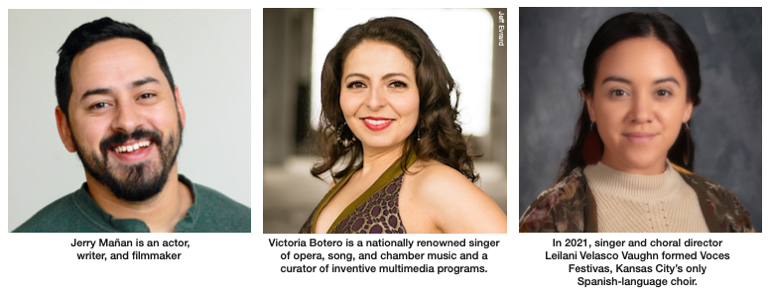Latin Americans have played a major role in the growth of greater Kansas City for at least two centuries, probably beginning with the founding of Independence, Missouri, in 1821. Yet even as the Hispanic population today has grown to some 10 percent of the region’s 2.1 million inhabitants, Kansas City’s Latinos still find themselves struggling for representation in politics, civic life, and the arts.
This year’s celebration of National Hispanic Heritage Month (September 15th to October 15th) comes at a critical time for local arts, when organizations large and small are taking a searching look at issues of diversity and focusing new scrutiny on past inequities and future opportunities. And because the arts can play such an important role in articulating or exercising a sense of “heritage” (Merriam-Webster defines it using such words as legacy, inheritance, tradition, and birthright), these initiatives may be poised to push our city toward a profound cultural transformation.
Quite a bit has happened in a relatively short time. In recent years, the Unicorn Theatre has programmed several plays dealing with Hispanic life and culture (including last season’s production of Satya Chávez’ Refuge and Karen Zacarías’ witty Native Gardens this season), and other theaters have featured leading Latino playwrights and artists: alongside increasingly diverse offerings from Black, Asian, and Native American artists.

The Unicorn Theatre’s Native Gardens starred Mark Robbins, Justin Barron, Areli Gil, and Merle Moores.
The Kansas City Ballet and Lyric Opera of Kansas City have both highlighted ample Latino talent in their respective worlds. In recent seasons the Ballet has performed works of world-renowned Hispanic choreographers such as Irene Rodríguez, Septime Weber, Stephanie Martínez, and Annabelle Lopez Ochoa. Moreover, the company has continued to diversify its roster, and Latino dancers have proved central in that process.
The Harriman-Jewell Series has four upcoming performances by Hispanic artists this fall, including the Minería Symphony of Mexico (featuring conductor Carlos Miguel Prieto and pianist Gabriela Montero), Disney PIXAR’s Coco with live orchestra, Peruvian tenor Juan Diego Flórez in recital, and John Adams’ cantata El Niño: Nativity Reconsidered.
“During the last two decades we’ve seen phenomenal artists coming out of Latin America, performing on the very highest levels,” said Clark Morris, vice president for advancement at William Jewell College and executive director of the Series.
Deborah Sandler, Lyric Opera general manager, has noted the same trend among singers nationally, even as operas by Latino composers have been slow to make inroads into the repertoire. The Lyric has engaged more than two dozen Hispanic singers in recent years. “There are a lot of great Mexican singers,” she said, adding that one of these, Diego Torre, performs in the Lyric’s upcoming production of Pagliacci. “Mexico seems to foster this development, as does Latin America in general. … And a lot of the large cities with big Hispanic populations in Texas, New York, and California have had robust training programs.”
Three local fine arts groups have focused their efforts specifically on the music of Latin America. Ensemble Ibérica, which celebrates its 10th anniversary this season, is devoted to the music of Spain, Portugal, and their myriad former colonies. (See separate feature in this issue.) Leilani Velasco Vaughn and the Choral Foundation established, in 2021, Kansas City’s first Spanish-language chorus, Voces Festivas. And Victoria Botero’s The Cecilia Series devotes much of its programming to music and culture of Latin America.

“There are 20 Spanish-speaking countries, and each one has its own distinct culture and food and music and literature,” said Victoria, a brilliant soprano and the daughter of Colombian immigrants, in stressing the multiplicity of her culture. “Being Latin is not a racial category, because all of us have some indigenous, African, and European heritage.” Many Latinos feel ancestral ties to the past, regardless of their roots, and music plays a special role in this.
“There are people whose families have been in the United States for multiple generations, particularly from Mexico, who still have that connection … often through food, or through the stories their grandmothers told them.”
For her Cecilia Series, Victoria is currently preparing a program devoted to music and writings connected to fellow Colombian Gabriel García Márquez. Gabo: A Love Letter (October 12th, The 1900 Building) weaves traditional and classical songs, arias, and readings from (and about) the Nobel Prize-winning author’s One Hundred Years of Solitude and Love in the Time of Cholera.
For Victoria, it’s a personal journey. “I was born into this,” she said. “I was raised with the stories of Márquez and the food and listening to Colombian music. I always go back to this feeling I had when I was a little girl: My parents loved to have parties and invite all the Colombians they knew. … And they were allowed to be 100 percent Colombian for just a few hours.”
Jerry Mañan can identify with this connection. The local actor, author, and filmmaker, who is often seen on local stages, was selected to serve on the board of Kansas City Actors Theatre, becoming one of the most prominent Latino artists in the city. Jerry has helped push the company’s diversity efforts forward, “and I’m not just talking about race, I’m talking about disabilities and other things. … Sometimes we forget what diversity means in its entirety.”

Irene Rodriguez’ ballet, Amor Brujo, is based on Manuel de Falla’s famous music for Love, the Sorcerer. (Photo Credit: Mike Strong)
While Jerry acknowledged the importance of staging plays by Hispanic artists, he said it is also important that they be produced and directed by Latinos. Some day, in fact, he hopes that Kansas City can support a Hispanic theater company, “a space where Latinos, as artists and as audience members, feel welcome, and feel like their stories are being reflected on stage.”
And, he added: “that they’re not all about suffering and immigration.” It’s true that pain and hardship are realities for many Latinos, but contemporary authors today are putting out a wide variety of works, including comedies and light-hearted family dramas that do not always fit our populist tropes. “It’s important that we’re telling other stories too,” said Jerry, who is of Cuban and Colombian heritage, “because Latino culture is so much richer than that.”
Jerry finds it both amusing and frustrating that so few Latino plays deal with his own day-to-day experience. “It’s hilarious, because I don’t suffer,” he said. “I identify so much with my Latino heritage because I love it. And don’t get me started on the food, there’s definitely no suffering there,” he added with a laugh. “If anything, some of the richest moments of my life are when I’m eating Cuban or Colombian food.”
Cynthia Levin, who will soon step down after a 45-year tenure as producing artistic director of the Unicorn Theatre, has been at the forefront of diversity in Kansas City since 1979. In addition to the many artists whose careers she has fostered, she has almost singlehanded brought local premieres of now-famous Black, Latino, and Asian playwrights to the stage, for which she has earned a national reputation.

Many of these plays, such as Refuge, treat traditional immigrant issues (though in new ways). Others, such as Karen Zacarías’ Native Gardens, deal only obliquely with race, favoring instead a more general tale of otherness. “It’s not that every single playwright of color is going to write about their specific cultural experience,” Cynthia said. “The idea is to find different voices, and people of color who are writing.”
Karen Zacarías’ play was ideal for the moment, a “smart comedy that does have cultural references but is saying something universal about how we try to live together as neighbors: how we can share things with somebody who is very different from us.”
To reach Paul Horsley, performing arts editor, send an email to paul@kcindependent.com or find him on Facebook (paul.horsley.501) or Twitter/Instagram (@phorsleycritic).
Featured in the September 30, 2023 issue of The Independent.
By Paul Horsley